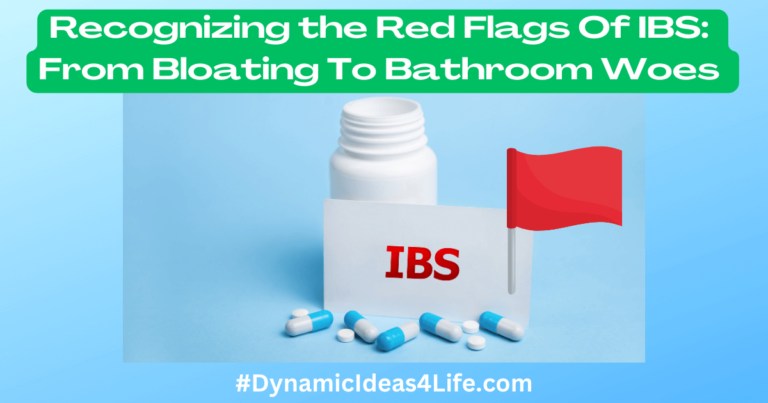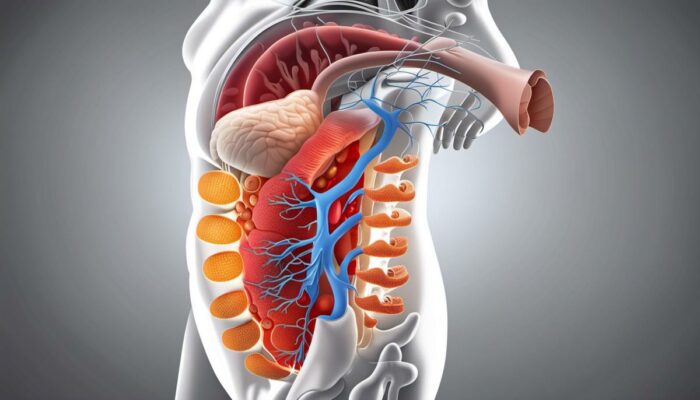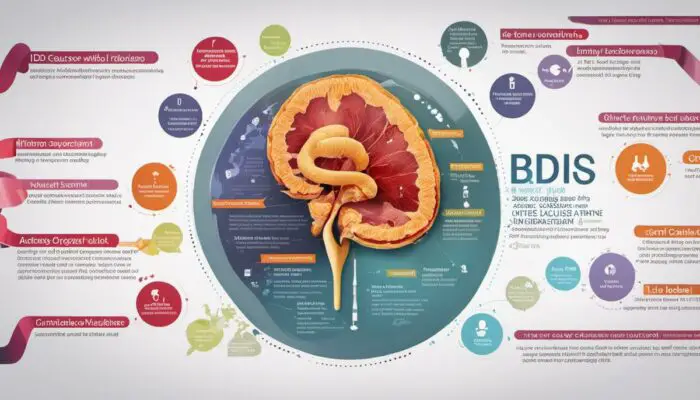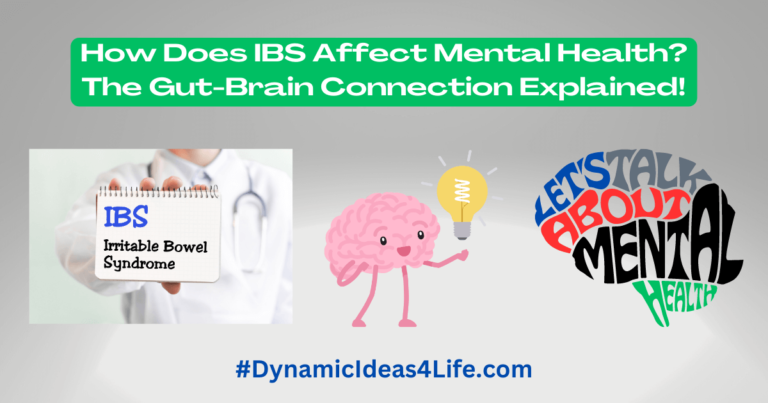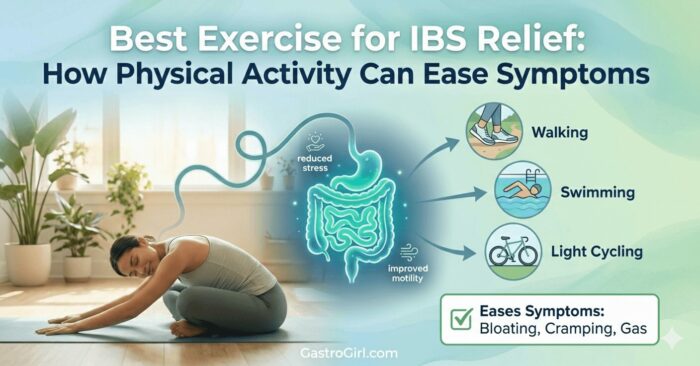Digestive health plays a pivotal role in our overall well-being, but conditions like Inflammatory Bowel Disease (IBD) and Irritable Bowel Syndrome (IBS) can significantly disrupt this delicate balance. Both disorders are often misunderstood and mistakenly interchanged due to their shared symptoms and effects on the gastrointestinal tract. This guide provides a comprehensive comparison, aiming to improve general knowledge and equip individuals with the understanding needed to seek appropriate healthcare services.
Understanding IBD vs IBS Symptoms – What To Look For?
Inflammatory Bowel Disease (IBD) and Irritable Bowel Syndrome (IBS) are two different conditions that affect the digestive system, yet their related names and similar symptoms often lead to confusion. IBD is an umbrella term encompassing chronic conditions that cause inflammation in parts of the digestive tract. The two most common types of IBD include Crohn’s disease, which can affect any part of the gastrointestinal tract, and ulcerative colitis, restricted to the colon and rectum.
On the other hand, IBS is a common disorder that influences the large intestine. Unlike IBD, IBS doesn’t cause inflammation, ulcers or other damage to the bowel.
Instead, it’s termed as a functional disorder, as the bowel simply doesn’t work as it should.
Symptoms of IBD
When it comes to the symptoms of IBD, including both Crohn’s and Ulcerative colitis, they can vary vastly. Typically, the symptoms develop over time rather than appearing suddenly. Both conditions can exhibit symptoms like prolonged diarrhoea, rectal bleeding, urgent need to defecate, abdominal cramps and pain.
Apart from these, weight loss and fatigue are notable symptoms in individuals with IBD. Fever and night sweats could also be experienced during a flare-up. Symptoms may cycle through periods of intense flare-ups and periods of remission.
Symptoms of IBS
IBS symptoms tend to come and go and often relate to eating and stress. Individuals with IBS often note abdominal pain or cramps, bloating, gas, and changes in bowel habits. Unlike IBD, bleeding is extremely uncommon in IBS. The abdominal discomfort is usually relieved by defecation and is commonly associated with a change in the frequency or form of stool.
It’s a chronic condition for which there is no cure, but a person suffering from IBS can manage the symptoms through medications, stress management, and dietary adjustments.
Understanding the Symptoms of IBD and IBS
A key differentiation point between Inflammatory Bowel Disease (IBD) and Irritable Bowel Syndrome (IBS) lies within the variety of symptoms they present. Both can cause abdominal discomfort and changes in bowel habits, but IBD usually presents additional signs such as blood in the stool, weight loss, and fever—symptoms not ordinarily associated with IBS.
IBD sufferers may also encounter nausea, a diminished appetite, and recurring fatigue, which are likewise less commonly found in those with IBS.
Another defining aspect is the potential for long-term bowel damage. IBS, by nature, doesn’t lead to lasting damage, whereas IBD, through persistent ulcers and inflammation, may cause irreparable harm and even significantly increase the risk of colon cancer.
Both IBD and IBS can cause significant disruption to daily routines. However, understanding their unique set of symptoms and seeking the right medical care can provide significant relief and effective management.
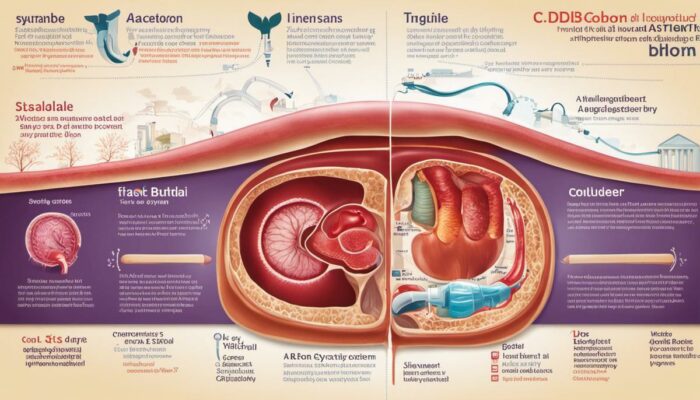
Symptoms of IBD
Detailed Symptoms of Inflammatory Bowel Disease (IBD)
Inflammatory Bowel Disease (IBD) is associated with a variety of disparate symptoms. An extremely common one is acute abdominal pain, often manifesting as continuous cramping or an unrelieved sensation of discontent within the stomach region, which may grow more intense following meals.
Another IBD trait is enduring diarrhoea, marked out by frequent, watery stools. Going beyond the few days of standard diarrhoea, the condition lingers and could be accompanied by the presence of mucus or pus.
IBD can also induce rectal bleeding, a symptom arising from ulceration in the lower gut and rectum. The bleeding can make bright red blood visible in the stool or on toilet paper after a bowel movement. Left untreated, this can lead to anaemia, signified by pallor and shortness of breath.
Weight loss is often another significant symptom for IBD sufferers. The inflammation in the gut impairs the digestion and absorption of food, making it difficult for patients to maintain weight. A subsequent drop in nutrients can bring about fatigue and the feeling of constant exhaustion.
Other sporadic symptoms, including fever, joint pain, and skin issues, can surface from the far-reaching effects of inflammation. These symptoms often occur cyclically, interspersing periods of relative wellness with intense flare-ups, rendering IBD a very challenging condition to control.
IBD vs IBS Symptoms
Both Inflammatory Bowel Disease (IBD) and Irritable Bowel Syndrome (IBS) names are commonly mistaken due to their akin acronyms and sharing a common area of effect, the gastrointestinal tract. Despite these similarities, the nature and manifestations of these conditions are quite different.
Both conditions shared symptoms such as altered bowel habits and abdominal discomfort, which tend to lead to confusion among non-medical individuals.
IBS should not be confused with IBD as it doesn’t cause inflammation or ulcers in the bowel like IBD. In addition, IBS doesn’t increase the risk of colorectal cancer, nor does it lead to severe complications like anaemia or malnutrition, unlike its counterpart.
Symptoms that are more suggestive of IBD rather than IBS include rectal bleeding, anaemia, unexplained weight loss, and those symptoms that continue beyond a few weeks. Because both conditions differ substantially in illness severity and progression, distinguishing between them is crucial.
The treatment plan for IBD typically involves long-term medical care, dietary changes, and in severe cases, surgical intervention. Whereas IBS treatment largely focuses on managing symptoms through dietary changes, stress management and occasionally, medications to regulate bowel movements, moderate intestinal muscles, or manage pain. Acquiring an accurate diagnosis is key to providing effective treatment.

What Are The Main Symptoms of IBS
Irritable Bowel Syndrome (IBS) is associated with a host of uncomfortable abdominal symptoms. Repetitive and persistent abdominal cramps or pain is often the first hint of IBS. This discomfort often corresponds to variations in bowel movements, and relief is usually found after passing a stool.
Bloating, leaving the abdomen feeling tight and full, is another regular symptom for many individuals battling with IBS. This is frequently coupled with excess gas, leading to increased discomfort.
A distinctive marker that separates IBS from other gastrointestinal conditions is the presence of excess mucus in the stool. This could potentially serve as a red flag signalling IBS in undiagnosed individuals.
Unpredictable and alarming changes in bowel habits, fluctuating between constipation and diarrhoea, are another typical characteristic of IBS. These fluctuations add to the psychological strain of living with the condition, as affected individuals may feel a loss of control over their bodily functions.
Moreover, individuals with IBS often encounter mental health issues, such as anxiety and depression. This could be attributed to the unpredictable nature of the symptoms, the associated physical discomfort and societal apprehension around discussing bowel-related problems which could lead to social withdrawal.
Unfortunately, the stress related to such a fluctuating condition can worsen symptoms, leading to a vicious cycle of mental and physical distress.
Symptoms of IBD
Unlike IBS, Inflammatory Bowel Disease (IBD) is a more severe and persistent condition. Consisting of two primary types known as Crohn’s disease and ulcerative colitis, IBD is defined by chronic inflammation within the digestive tract.
The symptoms can therefore be quite diverse and, depending on the type of IBD, can affect any part of the gastrointestinal tract.
The most common symptom of IBD is diarrhoea, which can be persistent and refractory to typical anti-diarrhoeal medicines. Along with this, abdominal pain and cramping may be felt, usually in the lower half of the abdomen.
Another key indicator of IBD is the presence of blood in the stool, indicating intestinal bleeding. Whilst blood is not a typical symptom of IBS, in IBD it emerges due to the inflammation eroding into the lining of the intestines.
Weight loss and reduced appetite are also commonly observed symptoms of IBD, due to the inflammation of the intestinal tissue impeding the body’s ability to digest and absorb nutrients from food. This can lead to malnutrition and consequent energy deficiency.
Moreover, individuals with IBD also experience systemic symptoms outside of the gastrointestinal tract, such as fatigue, fevers, night sweats, and joint pain, due to the increased inflammation in the body.
Mental health issues, including depression and anxiety, are also prevalent amongst IBD patients, as a response to living with a chronic, often debilitating condition.
A Comparison of IBS and IBD
While Irritable Bowel Syndrome (IBS) and Inflammatory Bowel Disease (IBD) may present with similar symptoms, they represent different health concerns with varying levels of gastrointestinal impact. IBS, a syndrome, is a collective name for symptoms causing discomfort and upset but does not signify illness or damage to the digestive tract itself.
The symptoms may be sporadic and often can be managed through lifestyle alterations such as diet changes, stress reduction and medication.
Conversely, IBD is a disease defined by chronic inflammation and harm to the gut lining. It can lead to severe complications such as intestinal bleeding, narrowing of the bowel, perforations, and in some cases, a higher risk of colon cancer. Management of these conditions is long-term and may necessitate potent anti-inflammatory and immunosuppressive drugs, or even surgery.
Whilst both conditions can dramatically affect a person’s life, IBD is generally deemed more severe and may lead to serious complications if inadequately treated. Nonetheless, anyone experiencing symptoms consistent with either condition is urged to seek medical advice for an accurate diagnosis and appropriate treatment.
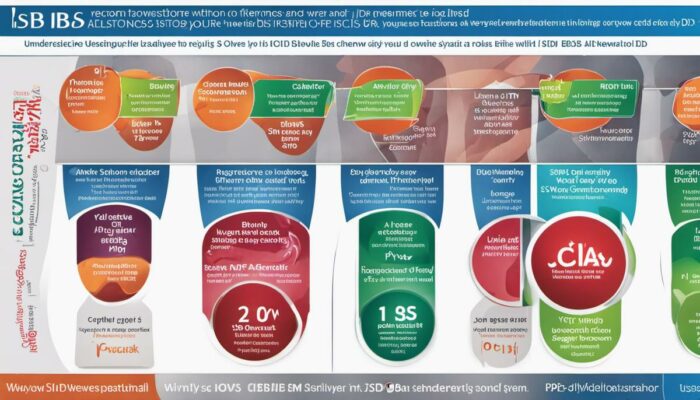
Comparing Symptoms and Diagnostic Processes
Inflammatory Bowel Disease: Recognising the Symptoms and Understanding the Diagnosis
The term Inflammatory Bowel Disease (IBD), encompasses conditions such as Crohn’s disease and Ulcerative Colitis, which result in chronic inflammation in your digestive tract. Common symptoms of IBD include abdominal pain, disabling diarrhoea, unexplained weight loss, and fatigue.
Other signs can include rectal bleeding, insistent urges to move the bowels, and stunted growth in children. The severity and consistency of these symptoms can greatly differ among patients.
The process to diagnose IBD usually involves a mix of blood tests to identify signs of inflammation or anaemia, stool tests to detect blood or inflammation and to rule out infections, and imaging tests like Computerised Tomography (CT) scans or Magnetic Resonance Imaging (MRI) to provide a detailed visual of the digestive tract. Where necessary, a colonoscopy or endoscopy may be carried out to internally inspect the colon, rectum or other areas of the digestive tract.
During these procedures, a biopsy may be conducted, where a small sample of tissue is removed for further laboratory investigation.
Irritable Bowel Syndrome: Symptoms and Diagnostic Processes
Irritable bowel syndrome (IBS) is a common condition affecting the large intestine, often characterised by a group of symptoms that occur together including abdominal pain, cramping, bloating, gas, and abnormal bowel movements (diarrhoea or constipation or both).
Unlike IBD, IBS doesn’t cause changes in bowel tissue or increase your risk of colorectal cancer.
The diagnostic process for IBS is often a process of exclusion. Healthcare professionals may initially rule out other possible conditions through blood tests, stool tests, X-rays, or a CT scan. More targeted tests may be suggested if the symptoms suggest IBS with diarrhoea, such as testing for gluten intolerance or a hydrogen breath test used to diagnose lactose intolerance and bacterial overgrowth.
A colonoscopy may be recommended if there’s a family history of certain other conditions, or if the patient is of an age when colorectal cancer becomes more common.
Discerning Between IBD and IBS Symptoms
Though IBD (Inflammatory bowel disease) and IBS (Irritable bowel syndrome) both present with digestive-related symptoms, the severity, duration and subsequent complications differentiate the two conditions substantially. IBD is characterised by severe manifestations such as ulcers, bleeding, loss of body weight and nutrient deficiencies, driven by inflammation and damage to the intestinal wall.
In contrast, IBS causes discomfort and inconvenience, however, rarely results in more serious conditions or enduring damage to the intestines.
For diagnostics, IBD poses a more convoluted and invasive process, comprising biopsies and imaging techniques. While IBS diagnosis also necessitates a careful medical examination, the tests are predominantly non-invasive and IBS often becomes the diagnosis after other causes for the symptoms have been excluded.
Regardless of the diagnosis, both conditions require professional medical input and patient diligence in managing and monitoring symptoms.
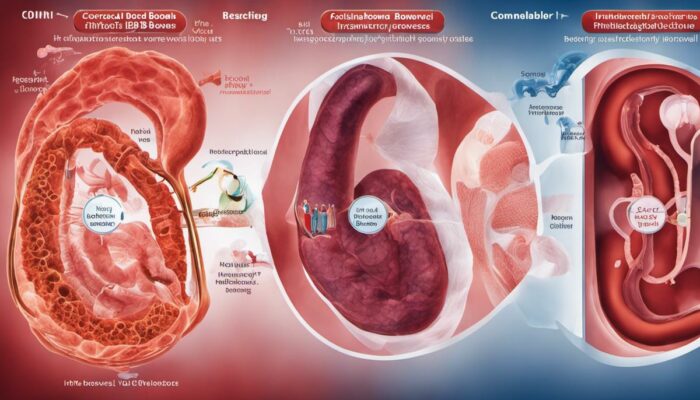
Treatment and Management of IBD and IBS
Navigating IBD Treatment and Management
The management of Inflammatory bowel disease (IBD) usually involves a combination of medications, diet modifications and, in severe cases, even surgery. Medicines for IBD are designed to attenuate the inflammatory response and can encompass aminosalicylates, corticosteroids, immunomodulators and biological therapies.
The choice of medicine hinges upon the severity of the symptoms and the patient’s response to treatment.
An essential component in managing IBD is dietary alteration under the guidance of a dietitian. Specific diets like the low-residue diet or the specific carbohydrate diet may be recommended. Consuming several small meals in place of a few large ones and staying well-hydrated can assist digestion.
In certain instances, particularly whilst dealing with types of IBD such as Crohn’s disease, surgery may be necessary when medication is ineffective, or complications such as fistulas, abscesses or intestinal obstruction arise. During surgery, the diseased portion of the bowel is removed and the healthy parts reconnected.
Regular follow-up appointments with healthcare professionals are vital whilst managing IBD, to monitor the progression of the disease. With the emotional toll that chronic IBD can take, psychological support can also be instrumental.
Treatment and Management for IBS
Irritable bowel syndrome (IBS) is a functional disorder, meaning it impacts the digestive system’s normal functioning without causing visible damage to the gut tissue. Hence, its management is focused more on controlling symptoms and improving quality of life.
Diet often plays a key role in managing IBS. Individuals might find that certain food types aggravate their symptoms. Therefore, dietary alterations, such as following a low FODMAP diet, often help improve IBS symptoms.
Amidst the several medications available, antispasmodics can help with abdominal pain and cramping, whereas laxatives and anti-diarrhoeal can manage constipation and diarrhoea, respectively. While these can be bought over the counter, some stronger versions require a prescription.
Low-dose antidepressants, not for their mood-altering effects, but for their ability to interfere with the transmission of pain signals to the brain, are also considered.
>>>Note: I would actually recommend CBD HERE as an alternative but this is really up to you<<
Healthcare professionals ensure that follow-ups are run regularly to monitor the symptoms and emotional health of IBS sufferers. As stress and anxiety can trigger IBS flare-ups, incorporating relaxation techniques, cognitive behavioural therapy, or gentle exercises like yoga can provide relief.
IBD vs. IBS Symptoms Comparison
IBD and IBS both present with gastrointestinal symptoms, but the key difference lies in the root cause. IBD involves chronic inflammation of the intestines, whereas IBS is a functional disorder affecting the digestive system without causing visible damage.
Hence, IBD symptoms can be more severe and systemic, encompassing loss of appetite, weight loss, fever, and sometimes leading to complications requiring surgery.
On the other hand, symptoms of IBS typically revolve around changes in bowel habits and abdominal discomfort.
Though IBD and IBS are distinct conditions, they can coexist in the same individual, and their symptoms can overlap, leading to challenges in diagnosis. Hence, understanding the key symptoms and differences is crucial for effective treatment and management.
Seeking regular professional medical advice and undergoing necessary medical check-ups are vital in the successful management of both conditions.

In Conclusion
Indeed, diagnosing and managing IBD and IBS can be complex, and personal experiences can vary widely. However, the emphasis always boils down to recognising symptoms, seeking medical advice, and for many adhering to prescribed treatments.
While lifestyle adjustments like diet modification can help control symptoms, it’s equally vital to monitor mental health, as the impact of these conditions can often go beyond physical discomfort.
In a realm as complex and individual as digestive health, maintaining open conversations with healthcare professionals and ever-adapting personal care regimes can pave the way towards improved well-being.
>>>Check Out Our Other Articles About IBS and IBD Relief HERE<<<



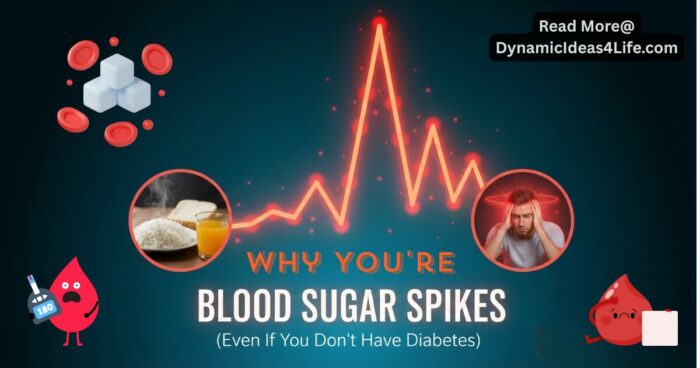
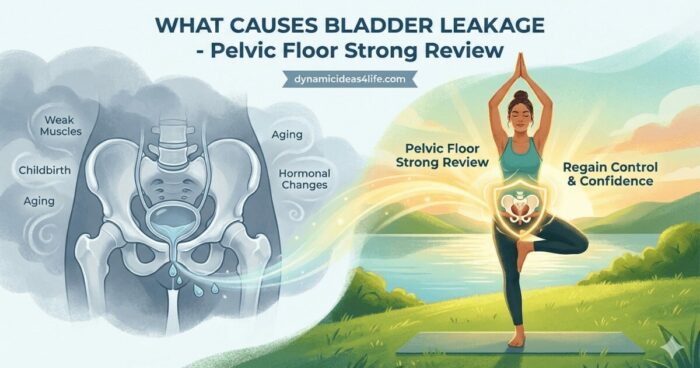

Anxiety and Depression BiOptimizers blood pressure supplements blood sugar control blood sugar support supplements cognitive function digital products Dr Sam Robbins Exercise Gut Health Gut Health While Travelling Health Tips for Travelling Healthy Living heart health HFL how to lower blood sugar levels How To Lower Cholesterol insulin resistance joint health supplement keto dieting Keto Diet Weight Loss leaky gut supplements leptin resistance list Magnesium deficiency Matt Gallant mental health multivitamins Nootopia Nootropics nutrient supplements Probiotics Probiotic Supplements reverse type 2 diabetes stress and anxiety stress relief Supplements vitabalance vitapost Wade Lightheart weight loss articles weight loss diet plans weight loss product reviews weight loss supplements weight loss tea

